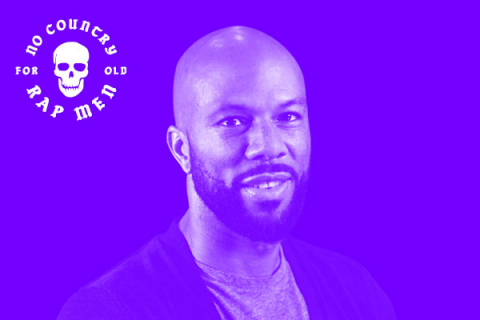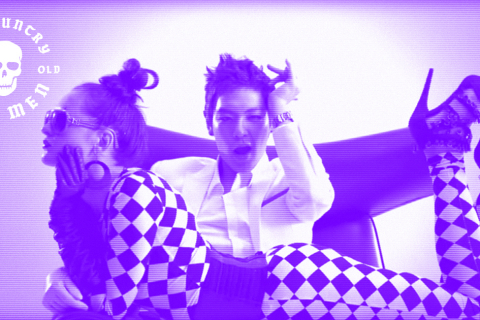
Now that rap is a well-established art form, capable of generating billions of dollars for everyone except for the people who actually make it, it has long since entered the ‘concept album’ stage. Just like all the rock bands attempted to graduate from making songs about getting high and chasing skirt by making rock operas. This wasn’t always a bad thing, as folks seemed to enjoy Pink Floyd’s The Wall, The Who’s Tommy and David Bowie’s The Rise and Fall of Ziggy Stardust and the Spiders From Mars just fine, but there are dozens more that found their final resting place in cut-out bins and charity shops.
Rap albums that followed an overall theme have been around since the days of Slick Rick and Kwame, and were further developed by the likes of De La Soul as they tied it all together within the framework of skits, courtesy of production mastermind Prince Paul. Having cut his teeth in the pro DJ circuit in the mid-eighties in between holding down a position as part of Stetsasonic, ‘the Original Hip-Hop Band,’ Paul soon tired of being the ‘kid from Long Island’ amongst a crew of Brooklynites and began to seek creative challenges elsewhere. After injecting his unique sense of humour into three triumphant De La Soul albums, Mr Huston was handed the keys to the kingdom by Russell ‘Rush’ Simmons and proceeded to create a concept album based around three West Indians living in New York who had never gotten their citizenship papers. If that isn’t early nineties Top 40 Billboard material, I don’t know what is.
Shockingly, Rush Associated Labels—having already poured good money after bad into the likes of The Afros, No Face, and Byches With Problems—blanched from releasing the Resident Alien album after Double Brain, Mr. Bugs, and Dragon’s ‘Mr. Boops’ single failed to set the world on fire. Frustrated at having his time wasted, Paul struck back at the music industry with a rag-tag group of other rap label orphans—The RZA, Fruitkwan, and Too Poetic, who had all been on the receiving end of unsatisfactory deals with Tommy Boy Records at one point or another, and formed The Gravediggaz. 6 Feet Deep (aka Niggamortis) made a solid case for both a ‘supergroup’ that had a tangible chemistry between its members and for the effectiveness of a proper rap concept album when it was released in 1994, managing to stay on topic for its entire duration.
Two years later, Kool Keith and Dan The Automator dived even deeper into the pool of the bizarre with Dr. Octagonecologyst, one of the first in a series of amusing character studies from former Ultramagnetic MC’s mastermind Kool Keith, who also gave the world the likes of Black Elvis and Dr. Dooom. Featuring trippy beats and raps that often involved reading out technical manuals verbatim, the Dr. Octagon album proved to be a cult smash with people who usually hate rap, and thus the floodgates were flung open.
With the indie hip-hop scene in full swing by this stage, rappers were finally given the creative freedom to try whatever the hell they wanted without the pressures of radio spins and music video rotation. Over the second half of the nineties and beyond, you couldn’t scratch yourself without a rap concept album appearing every other week. Del delivered the sci-fi extravaganza Deltron 3030, Masta Ace built on the loose concepts of his earlier albums to create the audio cinema of Disposable Arts and A Long, Hot Summer and MF Doom explored a series of personas such as Viktor Vaughn and King Geedorah.
Organized Konfusion went the whole hog in 1997 with The Equinox, an over-ambitious attempt at creating an audio rap movie which fell short due to its predictable plot but wasn’t without some shining moments, while Prince Paul returned to show the kids how it was done with A Prince Amongst Thieves, an all-star rap opera that was mind-blowing for the first three spins but had limited replay value in the same way that comedy albums are very much ‘one and you’re done’ experiences.
More recent examples include Kendrick Lamar’s Good Kid, M.A.A.D. City, which apparently tells a highly complex story, which I’ve been unable to follow despite repeated attempts (clearly I lack the masterful intellect that K. Dot fans are blessed with to properly digest his genius). There’s also Ghostface Killah’s Twelve Reasons To Die 1 & 2, and Jay Z’s American Gangster, which is nothing more than a hollow excuse for this captain of industry to rap about drugs without upsetting Oprah.
For my money, the most effective rap concept albums take a subtler approach than just playing a character or telling a story. The Alchemist’s Russian Roulette and Prodigy’s Product of the 80’s are great examples of musically conceptual albums that ignored any pretence of specific narrative or characterisation, and as a result have proven to have a lot more replay value and longevity. Once I know how I story ends, I’m less inclined to revisit it—unless the telling is so utterly masterful that it can’t be denied—whereas a strong sonic thread with well-chosen guests never gets stale.



